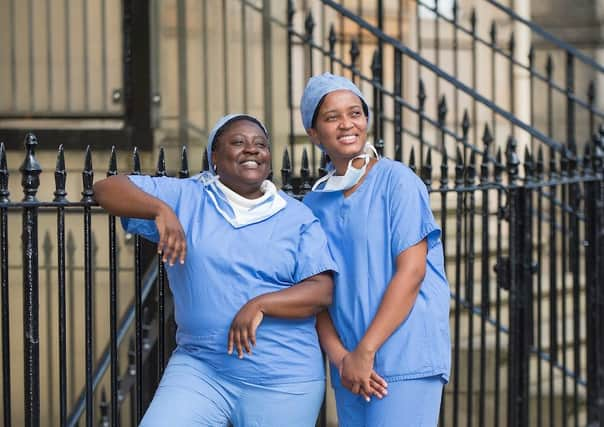Malawi medics dropped into Scottish hospital life
This article contains affiliate links. We may earn a small commission on items purchased through this article, but that does not affect our editorial judgement.


Dr Takondwa Itaye-Kamangira and Dr Wone Banda have been brought to Scotland by the Royal College of Physicians and Surgeons of Glasgow under a UK Government scheme to develop new skills in the face of rapidly changing healthcare demands at home.
Dr Itaye-Kamangira, 35, is a trainee at the Queen Elizabeth Hospital in Blantyre, Malawi, one of only two referral hospitals to serve a population of more than 16million people.
Advertisement
Hide AdAdvertisement
Hide AdThe medic hopes to specialise in breast surgery during her time in Scotland given a rising incidence of cancer in Malawi with hopes that learning good practice at the Royal Alexandra Hospital in Paisley will make a difference to patients in one of the world’s poorest countries.
She said: “We are seeing more cancer cases in Malawi, perhaps because we are leaning more towards a western lifestyle. Diet is changing. It could also be down to genetics and an increased awareness of the disease among more people.
“In Scotland I hope to learn more skills both with my hands but also in the professional way of doing things.
“One day we will be taking over from our bosses and you have to know how you are going to make the best difference that you can in your calling to be a doctor.
“When I go home, I will have worked in a place with all the resources and be able find a way to make things work, despite our limited resources.”
One of the biggest differences in hospitals in Scotland was the older make-up of hospital patients, many with cancer, she said. At home, patients tended to be younger and suffering from HIV related infections such as TB and sepsis with trauma- through violence and accidents - also common.
Dr Itaye-Kamangira - also known as TK - did have some prior knowledge of Scotland given that her late father spent some time studying at Strathclyde University in the 1980s. She recalled how he returned home to Malawi with a kilt, and liked to mimic the Scottish accent.
She added: “I was very determined to come here. Everyone warned me about the weather. I did bring an umbrella but when I arrived, it was so sunny. People have been so welcoming. You feel safe here and when you get lost, people help.”
Advertisement
Hide AdAdvertisement
Hide AdThe medic arrived in Scotland two weeks ago with her counterpart Dr Banda just completing her year training at the end of her training at the Glasgow Royal Infirmary burns unit. Her hope is to now expand plastic surgery units across her home country. Currently there are only two plastic surgeons in Malawi.
The Royal College of Physicians and Surgeons of Glasgow this weekend undertook a 51-mile cycle around the Firth of Clyde to help raise £50,000 to fund future placements in Scotland and medical training in Malawi.
The team will be led by Mr Mike McKirdy, college vice president (Surgical) and consultant general surgeon at the Royal Alexandra Hospital.
He said the healthcare needs of Malawi and other sub-Saharan countries brought into “sharp focus” the need to advance the skills of their medics.
Mr McKirdy added: “Sub Saharan Africa alone has 24% of the global burden of disease but only 3% of the health workforce. This is a global issue but we are focused on helping locally, by identifying needs and responding with targeted support.
“There is a strong historical bond between Scotland and Malawi. It’s a two-way relationship. Working alongside TK and Wone allows us to pass on valuable expertise but we learn so much from them in return. The resilience and expertise of medical teams working in the most difficult situations are inspiring for their peers in Scotland. Our fundraising efforts will further strengthen this relationship.”
Dr Itaye-Kamangira said she had been “overwhelmed” to learn of the fundraising cycle by the Royal College.
She said: “For people to take their time to help us make a difference is very touching and really overwhelming. I don’t really even have the words to describe it.”
DOWNLOAD THE SCOTSMAN APP ON ITUNES OR GOOGLE PLAY
